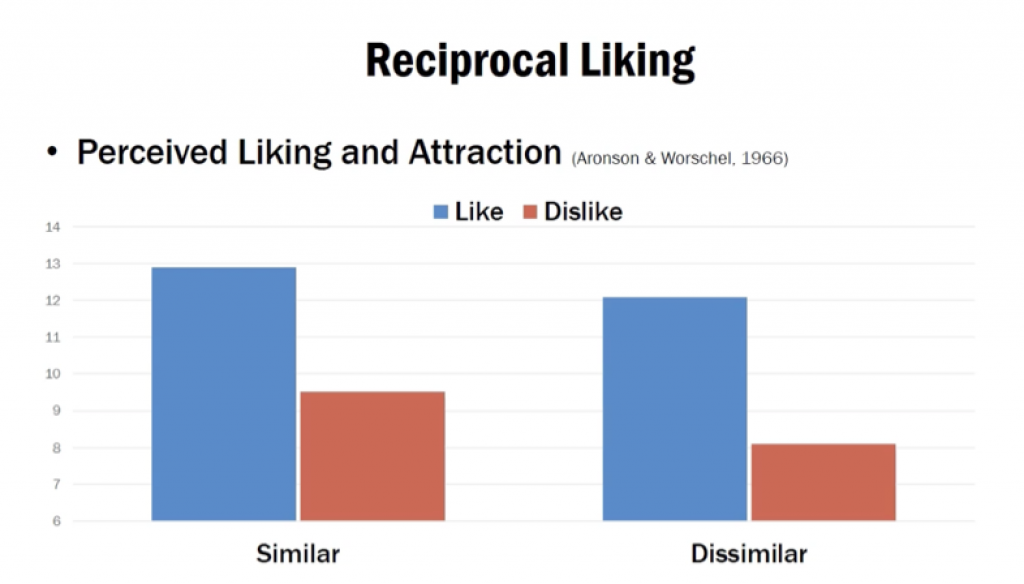“I like you.”
Sounds simple, but this short sentence has a remarkable affect on a person’s propensity to be attracted to you.
The final component we’ll cover on the psychology of attraction has launched numerous romances, has undergirded many successful sales careers, and has even turned a few people into billionaires.
The concept is called “liking.”
What do you like? What do others like? How is the liking expressed to you? How is the liking expressed to others around you? Are there more effective ways to express liking? What happens if you hear about someone else liking you?
You’ll feel like you’ve been to a junior high school girls slumber party by the time we’re done discussing this topic.
I know that doesn’t sound fun, but it’s one of the most influential techniques high-performing recruiters use to attract new agents.
Understanding “Liking”
Researchers have discovered we “like” people who “like” us. More specifically, we’re attracted to individuals who we believe have a high opinion of us.
Similar to the other concepts we’ve discussed (Part 1,2, 3), this principle of human relating has been expensively researched.
One of the most interesting studies (Aronson & Worchel, 1966) involved two groups of students. Each student met with a confederate (a person “in” on the research) under the guise of starting work with the stranger on an upcoming experiment.
For the meeting, the students were intentionally paired with a confederate who either had very similar values or very different values.
Here’s where things get interesting.
After the meeting, each of the students was provided some written feedback from the confederate (the person they previously met with) on how the meeting went. The feedback for half of the group looked something like this:
The feedback for the other half of the group was similar, but had one important difference.
That second bit of feedback stings a little. The message was carefully crafted to communicate the confederate didn’t like the student with which he met.
Liking Trumps Other Factors of Attraction
The final step in the study measured what the student thought of the confederate at the end of this exchange.
If a student perceived the confederate liked him or her, the student was attracted to the confederate.
If a student perceived the confederate didn’t like him or her, the student had a very negative opinion of the confederate.
Interestingly, the perception of likability was so strong, the student tended to ignore the values (similarity or dissimilarity) of the confederate in forming the opinion. As we discussed in our last WorkPuzzle, this is normally a very strong factor in determining attraction, but in this case it was ignored.
Recruiting and Likability
This principle as it is applied to recruiting is simple: Candidates will be strongly attracted to you if they become convinced you like them.
Here are some ways to communicate your likability for a candidate:
Give compliments. A sincere compliment communicates liking. For example, after the interview saying, “You really communicate well—better than most people I’ve interviewed in the past several months.”
Express liking directly. State your fondness of the candidate directly. For example, “I really enjoyed our discussion today. You’re one of the best candidates I’ve interviewed this year, and would enjoy working with you.”
Express third-person liking. This is an advanced technique, but even more effective than you communicating directly with the candidate. For example, if a recruiter calls a candidate as says, “I just heard from the hiring manager, and she said you’re the best candidate she’s interviewed in more than a year. You made quite an impression!”
Expressing likability should be integrated into almost every conversation you have with a candidate. You can’t afford not to use this technique.
Questions or Comments? Reply to your WorkPuzzle subscription email.
Didn’t get the WorkPuzzle email? Subscribe below. We promise not to share your email with others or use it for any other purpose but delivering WorkPuzzle notices.






